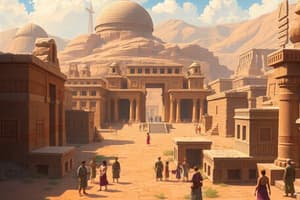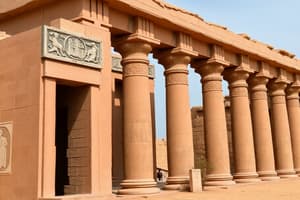Podcast
Questions and Answers
Which ancient region was known as Sumerians due to its first inhabitants?
Which ancient region was known as Sumerians due to its first inhabitants?
- Mesoamerica
- Nile Valley
- Indus Valley
- Mesopotamia (correct)
What was one of the primary reasons for the flourishing of agriculture in Mesopotamia?
What was one of the primary reasons for the flourishing of agriculture in Mesopotamia?
- Fertile land from alluvial soil deposits by rivers (correct)
- Abundant rainfall throughout the year
- Harsh desert climate encouraging crop diversity
- High mountains providing fresh water
Which ancient city in Mesopotamia was known for its trade routes connecting it to other cities like Nineveh?
Which ancient city in Mesopotamia was known for its trade routes connecting it to other cities like Nineveh?
- Thebes
- Ur (correct)
- Troy
- Carthage
Who was the Mesopotamian king known for a Code that laid down principles of justice influencing many subsequent laws?
Who was the Mesopotamian king known for a Code that laid down principles of justice influencing many subsequent laws?
What writing system did Mesopotamians use, based on cuneiform script carved into clay tablets?
What writing system did Mesopotamians use, based on cuneiform script carved into clay tablets?
What is the significance of the artifacts discovered near Lake Turkana in East Africa?
What is the significance of the artifacts discovered near Lake Turkana in East Africa?
What characterized the economic activity in early African civilizations, according to the text?
What characterized the economic activity in early African civilizations, according to the text?
How did civilization develop differently in Africa based on the text?
How did civilization develop differently in Africa based on the text?
What was a common aspect of both Mesopotamian and African early civilizations according to the text?
What was a common aspect of both Mesopotamian and African early civilizations according to the text?
What distinguished Egyptian civilization from other African civilizations mentioned in the text?
What distinguished Egyptian civilization from other African civilizations mentioned in the text?
Flashcards are hidden until you start studying
Study Notes
Early Civilizations
The dawn of civilization is marked by significant milestones in human history where societies began to form complex structures with their own unique cultures. Two early civilizations—Mesopotamians and Africans—stand out as examples of how different environments can shape cultural development.
Mesopotamia: Located between the Tigris and Euphrates rivers, this ancient region was known as Sumerians due to its first inhabitants. Agriculture flourished here because of the fertile land created by the rivers' alluvial soil deposits.
Agricultural surplus allowed these communities to develop, leading to the establishment of cities such as Ur and Babylon. These settlements gave rise to trade routes connecting them to other cities like Nineveh. This economic growth eventually led to the invention of money using shells, clay tokens, and later metal coins.
To manage their growing populations, the people had to organize themselves politically. They elected kings who were often considered divine rulers. One such king was Hammurabi, whose Code laid down principles of justice that influenced many subsequent laws around the world.
Despite facing challenges from neighboring empires like Assyrians and Persians, Mesopotamians left behind an impressive legacy. Their advancements included writing systems based on cuneiform script carved into clay tablets, which helped preserve their heritage through centuries.
Africa: Evidence suggests humans have lived in Africa since more than two million years ago. While much less is written about African prehistory compared to European counterparts, there are several significant sites worth mentioning.
In East Africa, archaeologists discovered artifacts near Lake Turkana dating back over three million years. Stone tools found here indicate early humans used advanced techniques even before they migrated elsewhere.
South Africa also has important historical artifacts associated with Khoisan peoples. This area represents one of humanity’s oldest continuous single-lineage ancestries.
Egypt, though geographically part of North Africa, deserves special consideration among African civilizations. Its civilization emerged along the Nile River valley around 3200 BC. By 2900 BC, Egypt formed city-states ruled by Pharaohs; these monarchs oversaw major public works projects including pyramids and temples. Libraries filled with papyrus scrolls containing religious texts, mythology, poetry, and legal codes further attested to Egyptian culture's complexity.
Civilization in Africa developed differently depending upon local resources available in specific regions within the continent. However, some commonalities exist across regions for instance, economic activity centered around agriculture and animal husbandry.
These two early civilizations - Mesopotamians and Africans - demonstrate how environmental factors could significantly influence societal developments. From agricultural surpluses enabling urban life in Mesopotamia to resource exploration shaping communities in Africa, understanding these early stages of human evolution helps us appreciate our current place in society today.
Studying That Suits You
Use AI to generate personalized quizzes and flashcards to suit your learning preferences.




